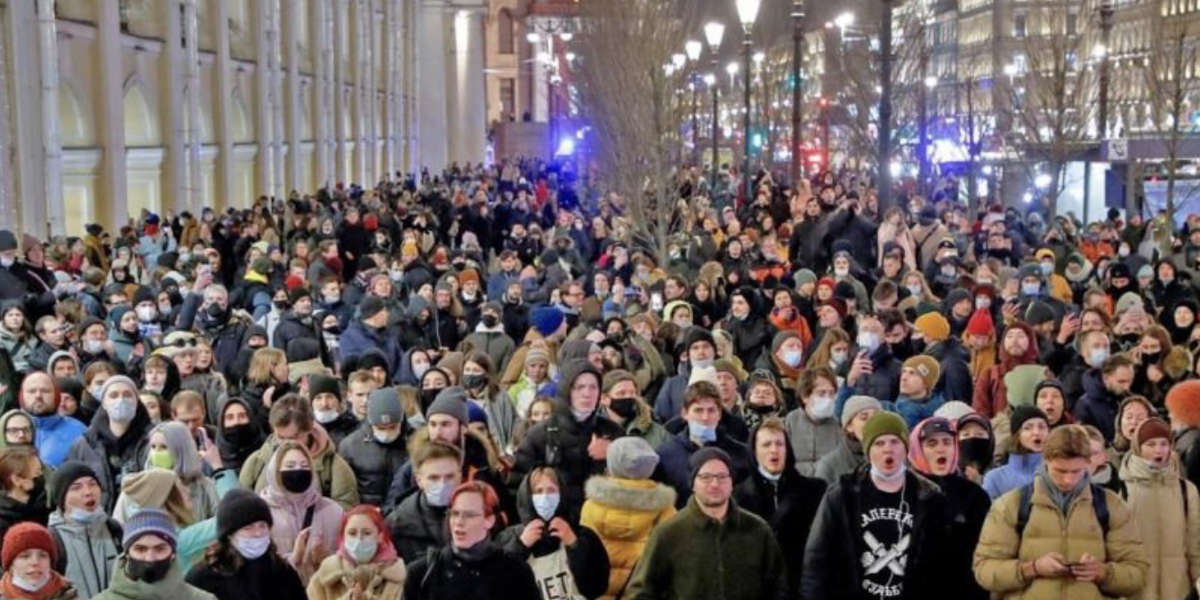In the picture
Anti-war rally in Russia after Ukraine invasion [Twiter].
The war in Ukraine can be resolved in a very short time if the Ukrainian army collapses quickly or if an internal coup rushes President Zelenski out of office, resulting in authorities with some legitimacy, however pressured, accepting Moscow's conditions. The conflict could be protracted, however, if, beyond the period during which Ukraine is able to sustain its defence, a guerrilla resistance prolongs the confrontation with the occupying forces.
The prospect of near-instant defeat may lead elements of the Ukrainian military command to force a political change that would at least secure the peace and integrity of most of the territory. Whereas the prospect of a war stalemate, which would be especially costly in lives for the attackers, would be the only scenario that could bring about the toppling of Vladimir Putin from within the Russian state.
Having demonstrated Putin's willingness to go all the way, at any cost, the scenario that can be described as "least damage" - in terms of issue casualties, but not only - is that of a short war. This would involve accepting, without further use of firepower, the Finlandisation of Ukraine in exchange for the new secessionist republics not being integrated into Russia. The minimal partition of the country might allow the Lugansk and Donetsk provinces to aspire to perhaps return to the national fold after the necessary time has elapsed. Of course, it would be more difficult for them to do so if they were to be diluted in Russia now. A future generation of Ukrainians might reconsider the political orientation of their country, when another, more open international order emerges, but it will have no chance of doing so if Ukraine disappears as an entity or survives greatly reduced in size.
Given the great difference in war potential between Russia and Ukraine and the realisation that neither country is going to fight alongside the latter - the supply of weapons offered to the Ukrainian army by the West improves its capabilities, but does not change the foreseeable result of the war - then the question over the prolongation of the conflict is more about whether Ukraine will become "a people in arms" against the invader, so that it suffers frequent sabotage and a continuous trickle of deaths in ambushes that undermine Putin's position at the helm of the Kremlin. Since the demise of the USSR, Ukraine has developed a clear sense of independence and many Ukrainians are willing to make it difficult for Russia. But in this scenario of revolts and attacks, Russia could harden its stance by absorbing the Donbas and perhaps also taking over a corridor to Crimea or even Odessa. And if thirty years of independence have produced young people with a strong sense of national identity, another thirty years of Moscow's rule could encourage Russian identity in these acquired territories.
Certainly, mixed scenarios are possible: a short military campaign followed by a lengthy harassment by Ukrainian irregular forces, an ironclad defence by the Ukrainian armed forces that forces a Russian overexertion that creates doubts in the invading General Staff and Russian society, or a non-critical but ultimately complex status for Putin without him being overthrown in the long run. In any case, it does not seem that international economic sanctions, however effective they may be in strangling the Economics and certain Russian fortunes, will prevent the consolidation of Russia's territorial annexations. Eight years after the seizure of Crimea, despite the punishment meted out by the West, it seems more likely that the peninsula will remain Russia's possession forever.
The first moves of the invasion seem to indicate that Putin's strategy is to show that he is willing to download use all possible force on his neighbour, hoping that the first bombardments and entrance of tanks will be enough to make the Ukrainian army and elites crumple and accept the installation of a puppet government. As Ukrainian casualties mount, the call for a compromise is likely to grow in the country; if it is slow in coming, Putin could increase the destruction. There is little doubt that Putin will win the war, in its strictly military phase, although the longer the process of appeasement drags on, the more it will cost him - and certainly Russia.

